Related Research Articles

Fielding Harris Yost was an American college football player, coach and athletics administrator. He served as the head football coach at: Ohio Wesleyan University, the University of Nebraska, the University of Kansas, Stanford University, San Jose State University, and the University of Michigan, compiling a coaching career record of 198–35–12. During his 25 seasons as the head football coach at Ann Arbor, Yost's Michigan Wolverines won six national championships, captured ten Big Ten Conference titles, and amassed a record of 165–29–10.

Carroll University is a private university in Waukesha, Wisconsin, United States. It was established in 1846 as Wisconsin's first four-year institution of higher learning. The university is affiliated with the Presbyterian Church (USA).
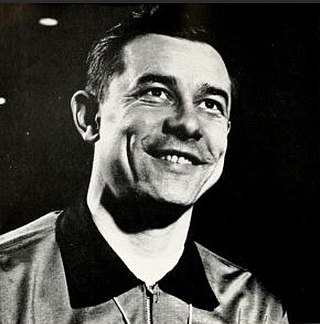
Walter Horner Lemm was an American football coach at the high school, collegiate and professional levels and achieved his greatest prominence as head coach of the American Football League's Houston Oilers and the National Football League's St. Louis Cardinals.

Glenn Franklin Thistlethwaite was an American football, basketball, baseball, and track and field coach. He served as the head football coach at Illinois College (1908), Earlham College (1909–1912), Northwestern University (1922–1926), the University of Wisconsin–Madison (1927–1931), Carroll College—now known as Carroll University—in Waukesha, Wisconsin (1932–1933), and the University of Richmond (1934–1941), compiling a career college football record of 117–74–16. Coaching at Northwestern from 1922 to 1926, Thistlethwaite compiled a 21–17–1 record, making him one of the most successful coaches in Northwestern Wildcats football history. In 1926, his team won a share of the Big Ten Conference title, only the second in school history, and his tenure sparked a revival in Northwestern football after a post-World War I decline. From 1927 to 1931, Thistlethwaite coached at Wisconsin, tallying a 26–16–3 mark. From 1934 to 1941, he coached at Richmond, where he oversaw the school's entry into the Southern Conference in 1936. Born in Franklin, Indiana in 1885, Thistlethwaite died at the age of 71, on October 6, 1956, of a heart attack at a hospital in Richmond, Virginia.

Bradbury Norton Robinson Jr. was a pioneering American football player, physician, nutritionist, conservationist and local politician. He played college football at the University of Wisconsin in 1903 and at Saint Louis University from 1904 to 1907. In 1904, through personal connections to Wisconsin governor Robert M. La Follette, Sr. and his wife, Belle Case, Robinson learned of calls for reforms to the game of football from President Theodore Roosevelt, and began to develop tactics for passing. After moving to Saint Louis University, Robinson threw the first legal forward pass in the history of American football on September 5, 1906, at a game at Carroll College in Waukesha, Wisconsin. He became the sport's first triple threat man, excelling at running, passing, and kicking. He was also a member of St. Louis' "Olympic World's Champions" football team in 1904.
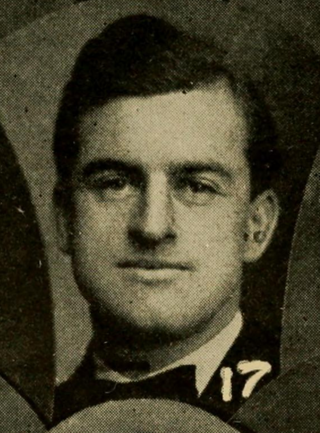
Edward Bulwer Cochems was an American football player and coach. He played football for the University of Wisconsin from 1898 to 1901 and was the head football coach at North Dakota Agricultural College—now known as North Dakota State University (1902–1903), Clemson University (1905), Saint Louis University (1906–1908), and the University of Maine (1914). During his three years at Saint Louis, he was the first football coach to build an offense around the forward pass, which became a legal play in the 1906 college football season. Using the forward pass, Cochems' 1906 team compiled an undefeated 11–0 record, led the nation in scoring, and outscored opponents by a combined score of 407 to 11. He is considered by some to be the "father of the forward pass" in American football.
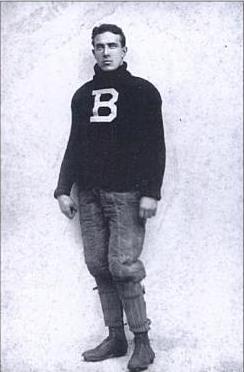
Thomas Austin Barry was an American college football coach and player, lawyer, and industrial adviser. He served as the head football coach at Tulane University, the University of Notre Dame, the University of Wisconsin, and the University of Denver. Barry attended Harvard Law School and Brown University, where he played on the football team and was named an All-American in 1902.
Ross Merle Masonholder was an American football and wrestling coach. He served as the head football coach at Carroll College—now known as Carroll University—in Waukesha, Wisconsin from 1982 to 2000 and Central Methodist University in Fayette, Missouri from 2001 to 2007, compiling a career college football coaching record of 108–142. Masonholder was also the head wrestling coach at Coe College in Cedar Rapids, Iowa from 1969 to 1971 and Cornell College in Mount Vernon, Iowa from 1971 to 1977.

Jeff Voris is an American college football coach and former player. He was most recently the head football coach at Butler University, a position he had held since the 2006 season, through the 2021 season. Voris served as the head football coach at Carroll College in Waukesha, Wisconsin from 2001 to 2005. He played as quarterback at DePauw University from 1986 to 1989.
John D. Schwender was an American college football coach. Due to significant injuries to his players during practice, the faculty of his school forced the discontinuation of the football program for one year.
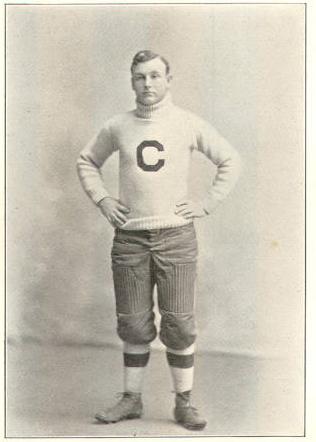
John Edmund Fries was an American football player and coach.

Phillip Norris "Army" Armstrong was an American football player and coach. He played college football at Centre College in Danville, Kentucky, from 1918 to 1919 and professionally for one season, in 1922, with the Milwaukee Badgers of the National Football League (NFL). Armstong served as the head football coach at Carroll College—now known as Carroll University—Waukesha, Wisconsin from 1923 to 1930, compiling a record of 44–11–6.
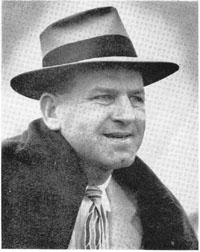
John W. Breen was an American football and basketball player, coach, and executive. He was active in the college ranks before becoming an administrator in the American Football League for the Houston Oilers.

Francis J. "Mickey" McCormick was an American football and basketball player and coach. He served as the head football coach at St. Norbert College from 1934 to 1942 and at Carroll College—now known as Carroll University—in Waukesha, Wisconsin from 1949 to 1957, compiling a career college football record of 69–57–9. McCormick was also the head basketball coach at St. Norbert from 1934 to 1943 and again during the 1944–45 season, tallying a mark of 62–74. He was one of the more outspoken coaches against the NCAA rule change on "free substitution" in 1953.
Stephen C. Miller is a former American football player, coach of football, basketball, and baseball, and college athletics administrator. He served as the head football coach at Carroll College—now known as Carroll University—in Waukesha, Wisconsin from 1972 to 1976, Morningside College in Sioux City, Iowa from 1977 to 1979, and Cornell College in Mount Vernon, Iowa from 1987 to 2001, compiling a career college football record of 121–94–2. Miller was also the head basketball coach at Cornell during the 1982–83 season and again from 1984 to 1988, tallying a mark of 49–61. He was named NCAA Division III coach of the year while coaching football at Cornell.
Robert Vogt Larsen was an American football coach and college athletics administrator. He served as the head football coach at Carroll College—now known as Carroll University— in Waukesha, Wisconsin in 1977 and the University of Chicago from 1980 to 1982, compiling a career college football coaching record of 7–28–1. Larsen was also the athletic director at Carroll from 1977 to 1980 and Chicago from 1980 to 1983. He played college football at Carthage College in Kenosha, Wisconsin and coached high school football as a number of schools in the state of Wisconsin.
Mark W. Williams was a United States infantryman who fought in Belgium and Holland. He was wounded twice and spent time in London hospitals. In the occupation forces, he played football in a number of Germany's stadia. After a successful business career, he reentered sports to be an American football coach at the college level, and was later an associate professor of Business Administration at Carroll University.

William Arthur Ganfield was an American pastor, educator, and academic administrator who was president of Centre College in Danville, Kentucky, from 1915 to 1921 and then of Carroll College in Waukesha, Wisconsin, from 1921 until his retirement in 1939.

Frederick E. Schacht was an American college football coach, player, and medical doctor. He served as the head football coach at Kentucky State College—now known as the University of Kentucky—from 1904 to 1905, compiling a record of 15–4–1.
References
- ↑ "The Wisconsin Presbyterian Review". 1903.
- ↑ Carroll College/University Athletics Archived 2006-05-16 at the Wayback Machine Football results
- ↑ St. John Daily Sun "Football Forbidden" October 20, 1903
- ↑ The Washington Post "Wisconsin College Bars Football" October 18, 1903
- ↑ Chicago Daily Tribune "Ban Put On Football" October 17, 1903
- ↑ The Waukesha Freeman Archived 2008-10-26 at the Wayback Machine "Foot Ball Team Reorganizes" September 29, 1904